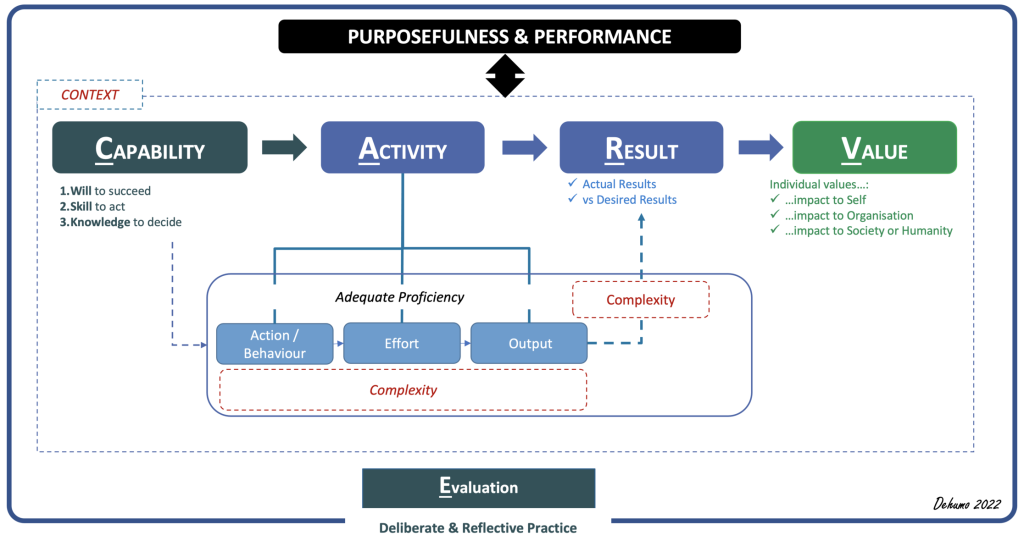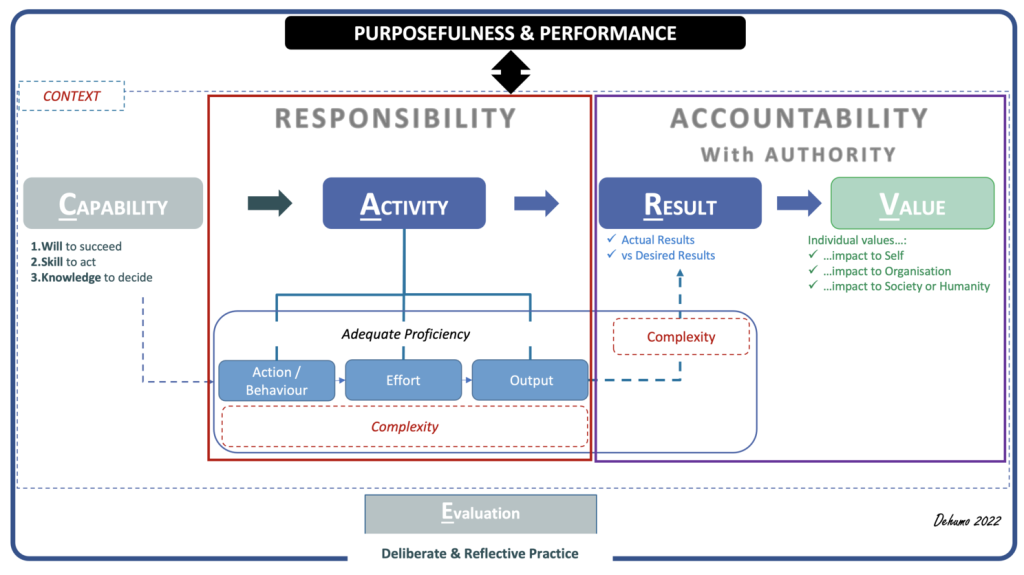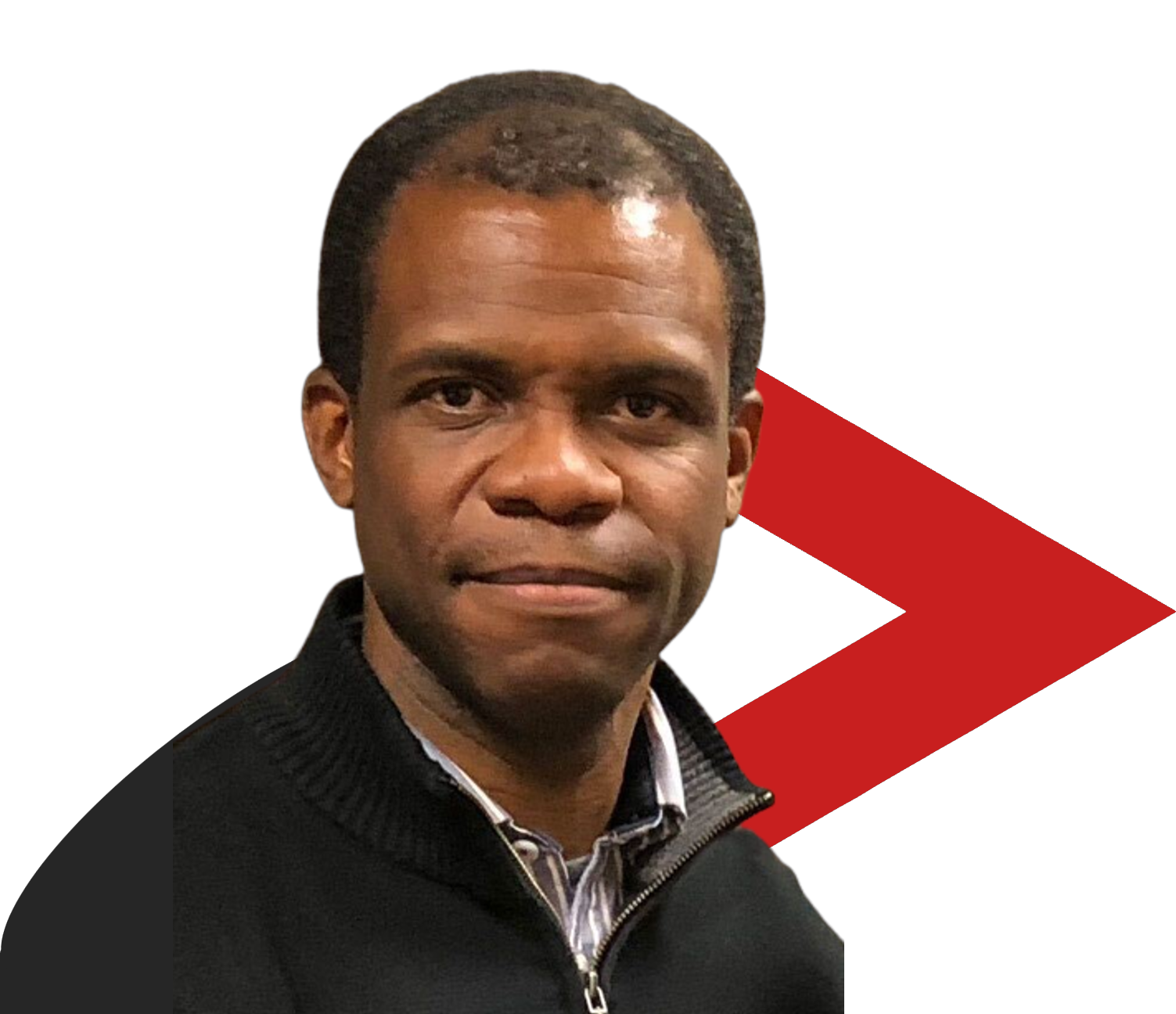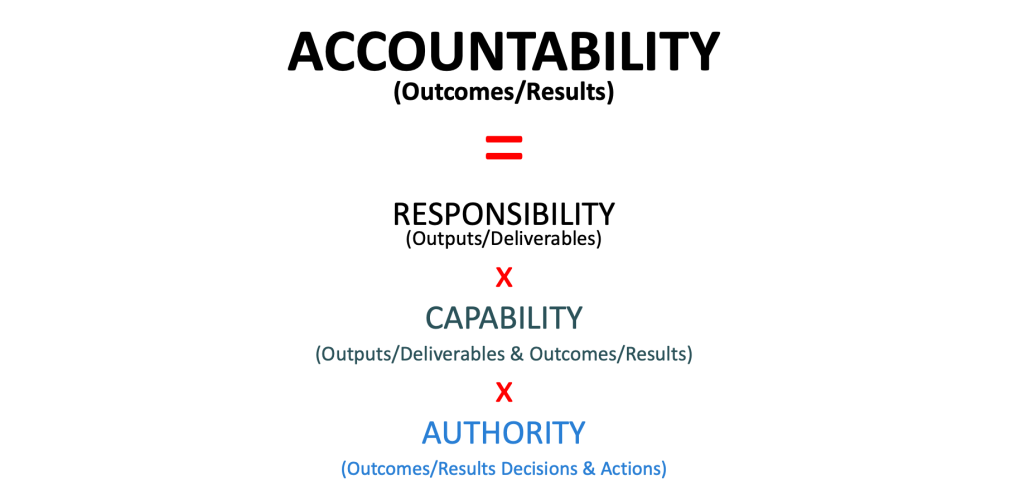There are two words that often get used interchangeably but I have always seen them as very different – Accountability and Responsibility.
Accountability from a CARVE Perspective
This series is based on the CARVE framework which I introduced in the article “CARVE your niche. your life. your rules“.

From this CARVE perspective, responsibility is for activity (action and outputs/deliverables) and accountability is for results (efficiency, quality, effectiveness, value delivered).

Accountability is having ownership of results which means if those results are not achieved, there’s only one person to look at and that’s you. There are no excuses, no saying that it was because someone else didn’t do something, there’s no explaining it away. You fully own the achievement of those results. In a role, accountability is demonstrating a commitment to fulfilling the purpose and delivering the true value of the role.
Because of this sense of ownership and knowing the buck stops with you, you do everything in your power to make those things happen, achieve the results, and solve the problems.

Author
Dehumo Bickersteth
Managing Partner momenta Group
For custom tailored leadership training
-
So think about the roles you are playing now, what results are you accountable for? What problems are you accountable for solving? What value are you accountable for delivering?
I watched this video on “Accountability vs. Responsibility by Bryan O’Connor“. In the video, he was sharing how he looks at the difference between these two very commonly used words. I watched the video a few years back when working on the CARVE framework and something about it just clicked and made a lot of useful sense to me.
So, the idea is basically that in order for you to be accountable, to really be able to own the achievement of those results, you need to have three things – responsibility, capability, and authority.

Responsibility
First, you need to know what outputs or deliverables need to be produced and completed for the results you want to achieve. Some of those things, you have to do personally, and for these, you are responsible, meaning if you don’t do those things, those things won’t get done.
The other things that need to be done, you may not be responsible for them, someone else might be responsible either because you have delegated it or because your output or deliverable depends on outputs someone else is responsible for delivering and without those outputs being delivered, the results that you’re accountable for will not get achieved. So this makes the difference really clear. While responsibility is for activities, getting things done, and producing the output, accountability is about achieving results.
Since every activity should be performed to achieve a clear result, it means all responsibilities (i.e the outputs and deliverables) have associated levels of implied accountability. You are always accountable for the direct results expected of your responsibilities, i.e. the quality of your output which is your contribution to a macro activity, must meet the requirements and expectations of that macro activity of which your output is a just part.
Individual and Non-Individual Contributor Differences
When you are an individual contributor, you are accountable for your own responsibilities. When you are a non-individual contributor like a team leader, you are accountable for your responsibilities and ensuring other people are accountable for their responsibilities. As a non-individual contributor, you are accountable for what I will call the macro activity-related results. This macro activity includes all the activities performed by all the members of your team. So accountability for the macro results means being accountable for what the other people do or don’t do as needed to achieve the macro results.
If these people are not delivering the required outputs/deliverables or not doing them well enough, your accountability means you should use all the means at your disposal to get that person to do them or do them well enough. If the person really cannot, then you find other ways to get it done so that the results you desire, the results for which you are accountable, get achieved. You cannot make excuses because if you are not chasing down the results, then you’re not being accountable and you are not really trying to fulfill the purpose of the role.
For these non-individual contributor-type scenarios, the actions you take towards ensuring these other people are able to deliver what they are responsible for at a level that is required (i.e. their accountabilities and related performance), are part of your responsibilities. These actions have their own unique clear output with clear results.
What this means is that where team members are not delivering on the expectations of their responsibilities, reassigning the responsibilities can help achieve the macro activity-related result. However, reassigning doesn’t achieve the related but separate result of enabling accountability for responsibilities, this requires a different set of actions. More on this in other posts.
So in summary,
- Your responsibility is for the activities that you have to do (output to produce or deliver), that will make sure the results get achieved.
- Your accountability is for the results, regardless of who else is responsible for the activities and outputs needed to achieve the results.
When you think about it from that point of view, you can see that when there’s a gap between your desired results and your actual results in the role that you’ve assumed full accountability for, you do not make excuses for why the results are not being achieved. You just do whatever you can to try to achieve the results.
Capability
This brings us to the next bit, do you have the capability to make the decisions and take the actions required to deliver the results? Do you have the capability to manage and deal with all the activities that need to be performed (direct and indirect), to ensure that what you’re accountable for gets achieved?
I wrote a post about capability earlier so I won’t repeat that here. The main point here though is that capability can refer to both your capabilities as the person and the capabilities of the system within which you are engaged:
- What capabilities does the system around you have that can be leveraged to achieve the results?
- Do you as a person, have the capability in terms of your knowledge, skill, and will, to achieve the results, including having the capabilities to effectively leverage the affordances of the system?
Authority
And then the third, which I thought was really interesting, is authority, specifically whether you have the authority to make the decisions and to take the actions that are necessary without the need to seek approval.
This is not just about authority to do what you need to do for individual outputs and deliverables, but, in the instance where your results rely on the deliverables of others, to do what you need to do to ensure that what others need to do get done.
Authority is about empowerment and it includes things like being able to make decisions about the use of resources at a level considered to be the key to the achievement of the results for which you are accountable. If you don’t have the authority, then it should limit your accountability for the level of decisions and actions that depend on the approval of someone with higher authority. It means for those specific decisions and actions, you don’t have the means to control the key enablers that will make the results achievable. This dependency on the approval of someone with the authority means you have to re-assess the scope of your accountability. Whoever has the authority to approve those specific decisions and actions has to be accountable for the related results.
To reiterate, everyone needs the authority to be accountable for the results directly related to their areas of responsibility. In simple terms, you are accountable for the results related to the decisions you can make and actions you can take without needing to seek approval or have it endorsed by someone with higher authority. For non-individual contributor roles, this idea extends beyond actions directed at managing themselves to include actions directed at managing other people, specifically how accountable these other people are for their responsibilities.
Accountability Helps You Develop Capabilities
Being intentional is about having clear desired results. Being purposeful is about having meaningful desired results. Being accountable is about taking ownership of achieving the meaningful desired results.
Accountability is about trust. Trust that the problem is in safe hands, the solution will be found, the value will be delivered. This trust is in the belief that you have what it takes to achieve the results for which you are being made accountable. ‘What it takes’ means you are able to recognize and effectively respond to any capability gaps needed to discharge your responsibilities at a level that delivers the result or truly has a fighting chance to deliver the results.
Even if your decisions and actions need to be endorsed or approved, if you are performing them at a level that consistently meets the expectations of the next level of authority, it means your responsibilities and capabilities are already operating at that level of accountability and it is a lot easier to simply give you the authority.
The ability to address capability gaps goes beyond the development layer. It enters into the meta-development layer. The point is that if you are not able to achieve the results, you trigger the development layer and if that is still not working, you trigger the meta-development layer. It is this meta layer that increases your chances of demonstrating capability levels that enable trust, especially for higher-level results that have a greater impact on the system which happens to be the expectation for more senior roles in organizations.
So, even if you do not yet have the authority for these higher-level results, the way you approach your responsibilities and demonstrate your accountability for your current responsibilities goes a long way to help you develop and demonstrate capabilities for achieving the next level of results.
Remember, accountability is observable and one of the observable behaviors is the response to capability gaps impacting the achievement of the desired results.
In Summary…
Take a moment and just ask yourself,
For what am I accountable? – in the roles that I’m playing, individual contributor or non-individual contributor, what results am I accountable for? Remember by results you are thinking about quality, effectiveness, impact, and value delivered.
For what am I responsible? – What are the actions that I need to perform, specific outputs and deliverables that I need to complete in order to achieve the results for which I am accountable?
What are my capabilities – Do I have the knowledge, skill, and will to make the decisions and perform the actions in this specific system, to achieve the results for which I am accountable? Am I able to effectively navigate and leverage the capabilities of the system to achieve the results?
Do I have the authority – Do I have the authority necessary to make decisions on all the necessary variables (resources, etc.) at the level that I need in order to be in control of the key enablers needed to achieve the results?
The above reflection points apply to all and any role you are playing not just professional roles. However, with professional roles, the subjectivity of the role expectations makes it more important that accountability with the required authority is discussed and clarified on an ongoing basis.
Remember, this is a fluid thing, it is not a one-time answer. It’s something that evolves. As you experience the role and as your understanding of the results and activities improve, your understanding of what you can be accountable for and the authority you need to be truly accountable will also increase and inform your decisions and actions.



